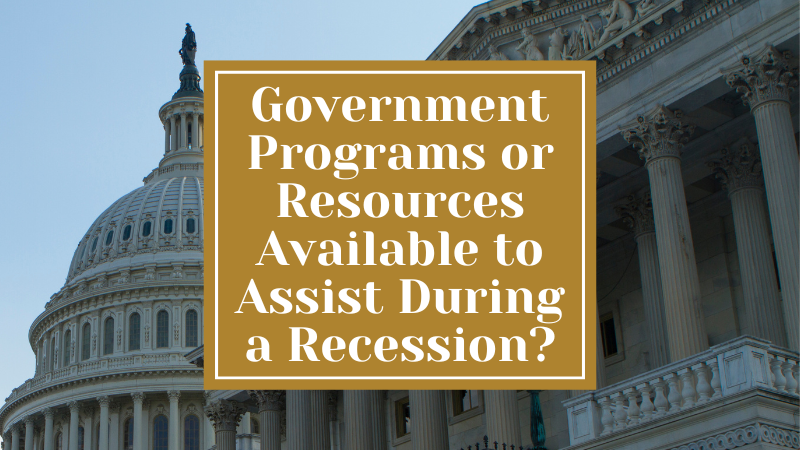During times of economic recession, governments play a crucial role in providing support and assistance to individuals and businesses facing financial hardships. Recognizing the adverse effects of a recession on employment, income, and overall economic stability, governments around the world implement various programs and resources to mitigate the impacts and help navigate the challenging times.
In this article, we will explore the wide range of government programs and resources that are typically deployed during a recession. We will discuss the financial assistance options available to individuals, including unemployment benefits, income support programs, and housing assistance.
For businesses, we will delve into initiatives such as loans, grants, tax relief, and incentives designed to support their operations and facilitate economic recovery. Additionally, we will highlight resources for retraining and upskilling, as well as counseling services for those affected by job loss or financial stress.
Understanding the diverse array of government programs and resources available during a recession is crucial for individuals and businesses alike. By taking advantage of these initiatives, people can receive the support they need to weather the economic downturn, maintain their well-being, and foster resilience for the future.
Let us now delve into the comprehensive range of government programs and resources designed to assist people and businesses during a recession.
How Does Government Decide How Much Aid to Provide During a Recession and When to Provide Aid?
Governments make decisions regarding the timing and magnitude of aid during a recession based on a variety of factors. These factors include the severity and duration of the economic downturn, the impact on different sectors of the economy, the needs of the population, and the available fiscal resources.
Governments typically rely on economic indicators such as GDP growth, unemployment rates, inflation, and consumer spending to assess the state of the economy. They also consider feedback from various stakeholders, including businesses, labor unions, economists, and social welfare organizations.
The decision-making process involves a combination of economic analysis, policy evaluation, and political considerations. Governments aim to strike a balance between providing immediate relief to those affected by the recession and implementing long-term strategies to stimulate economic recovery.
Aid packages may include measures such as fiscal stimulus, tax cuts, infrastructure investments, unemployment benefits, job creation programs, business support, and social welfare initiatives. The specific allocation of aid may vary depending on the government’s economic philosophy, policy priorities, and the specific needs of the country or region.
Governments also collaborate with international organizations, central banks, and other governments to coordinate efforts and leverage resources. They monitor the effectiveness of the aid measures through ongoing assessment and adjustment based on evolving economic conditions. The goal is to provide timely and targeted support to mitigate the impacts of the recession, promote economic stability, foster job creation, and support the well-being of individuals and businesses.
The decision-making process is dynamic and requires careful consideration of economic data, social welfare needs, and the ability to maintain fiscal sustainability in the long term.
Government Programs and Resources to Assist Individuals and Businesses During a Recession
During a recession or times of economic hardship, governments often implement programs and provide resources to assist individuals and businesses. These programs aim to mitigate the impact of the recession and provide support to those who may be facing financial challenges. Here are some common government initiatives and resources:
- Unemployment Benefits: Governments may offer unemployment benefits to individuals who have lost their jobs or experienced a significant reduction in work hours due to the recession. These benefits typically provide temporary financial assistance and may include job-search support or training programs.
- Small Business Loans and Grants: Governments often provide financial assistance to small businesses through loans or grants to help them sustain their operations, retain employees, or invest in recovery and growth. These programs may be administered by government agencies or in collaboration with financial institutions.
- Tax Relief and Incentives: Governments may introduce tax relief measures, such as tax credits, deductions, or deferrals, to ease the financial burden on individuals and businesses during a recession. These measures aim to stimulate economic activity and provide some relief from tax obligations.
- Job Training and Reskilling Programs: Governments may invest in job training and reskilling programs to help individuals acquire new skills or enhance their existing ones. These programs aim to improve employability and support individuals in transitioning to industries or occupations that are in demand during the recession.
- Financial Counseling and Debt Relief: Government agencies or non-profit organizations may offer financial counseling services to help individuals manage their finances during a recession. These services may include budgeting assistance, debt management advice, and resources for accessing debt relief programs.
- Economic Stimulus Packages: Governments may implement large-scale economic stimulus packages that include various measures aimed at boosting economic activity and employment. These packages often involve government spending on infrastructure projects, incentives for business investment, or direct financial support to individuals.
- Housing Assistance: Governments may provide assistance programs to help individuals and families facing housing-related challenges during a recession. These programs can include rental assistance, foreclosure prevention measures, or low-income housing options.
- Job Placement and Career Centers: Governments may establish job placement centers or career development centers that connect job seekers with potential employers. These centers often provide job search assistance, resume writing support, interview coaching, and access to job listings.
- Financial Support for Education: During a recession, governments may introduce financial aid programs or scholarships to support individuals pursuing higher education or vocational training. These programs aim to ensure access to education and skill development despite economic challenges.
- Mental Health and Counseling Services: Recognizing the emotional impact of a recession, governments may allocate resources to support mental health and counseling services. These services aim to help individuals cope with stress, anxiety, and other mental health issues that may arise during challenging economic times.
- Business Development and Support Centers: Governments may establish business development and support centers to provide guidance and resources to entrepreneurs and businesses. These centers can offer workshops, seminars, and consultations to help businesses adapt to the challenges of a recession and explore new opportunities.
- Industry-Specific Assistance Programs: Governments may introduce industry-specific assistance programs to support sectors that are particularly affected by a recession. These programs may include financial aid, incentives, or regulatory adjustments to help sustain businesses in those industries.
- Trade Adjustment Assistance: During a recession, governments may offer trade adjustment assistance to workers who have been negatively impacted by international trade. These programs provide support in the form of job training, employment services, and income support to assist affected workers in transitioning to new job opportunities.
- Social Welfare Programs: Governments may expand social welfare programs during a recession to provide additional support to vulnerable populations. These programs can include increased access to healthcare, food assistance, housing subsidies, or childcare subsidies to help individuals and families facing financial hardship.
- Economic Development Initiatives: Governments may implement economic development initiatives aimed at attracting investment, fostering innovation, and creating new job opportunities. These initiatives often involve partnerships between government, private sector entities, and educational institutions to stimulate economic growth and recovery.
- Financial Assistance for Essential Services: Governments may provide financial assistance programs to ensure access to essential services such as healthcare, utilities, and transportation. These programs can include subsidies, discounted rates, or waivers to help individuals and families afford these vital services during difficult economic times.
- Job Creation Initiatives: In response to a recession, governments may launch job creation initiatives to stimulate employment opportunities. These initiatives can involve public works projects, infrastructure development, or incentives for businesses to hire new employees.
- Business Counseling and Advisory Services: Governments may offer business counseling and advisory services to help entrepreneurs and businesses navigate the challenges of a recession. These services can provide guidance on financial management, business planning, market research, and accessing available support programs.
- Support for Nonprofit Organizations: Governments may provide support to nonprofit organizations that play a critical role in providing social services during a recession. This support can include grants, subsidies, or tax incentives to ensure the continuity of essential community services.
The specific programs and resources available during a recession vary from country to country and may be subject to change based on the severity and duration of the economic downturn. It is advisable to consult government websites, local authorities, or relevant agencies to stay informed about the specific programs and resources available in your area during a recession.
When Will the Government Start Providing This Aid If We Enter a Recession?
The timing of government aid during a recession can vary depending on the specific circumstances and the policy approach of each government. When a recession is officially declared or anticipated, governments often act swiftly to implement measures aimed at stabilizing the economy and providing support to individuals and businesses. However, the exact timing of aid initiatives can depend on factors such as the severity and longevity of the recession, the availability of fiscal resources, and the decision-making processes within the government.
In some cases, governments may already have contingency plans and established programs in place to address economic downturns. These plans can be activated promptly, allowing for a swift response to provide aid. In other situations, governments may need to assess the economic situation, consult with experts, and develop tailored policies and programs before implementing aid measures. This process may take some time as governments consider the most effective strategies to address the specific challenges posed by the recession.
It’s worth noting that governments may take both short-term and long-term approaches to aid provision during a recession. Short-term measures can involve immediate relief efforts such as unemployment benefits, stimulus checks, and financial support for businesses.
Long-term strategies may focus on initiatives to stimulate economic growth, create employment opportunities, and invest in infrastructure projects. The timing and implementation of these measures can be influenced by factors such as legislative processes, budgetary considerations, and coordination with other stakeholders.
Overall, governments aim to respond promptly to recessions and provide aid as soon as possible to mitigate the negative impacts on individuals, businesses, and the economy as a whole. The specific timing and extent of aid will depend on the unique circumstances of each recession and the policy decisions made by the government in question.
Final Thoughts on Government-Provided Aid and Resources During a Potential Recession
Government programs and resources are vital lifelines during times of recession, providing crucial support to individuals and businesses grappling with financial challenges. These initiatives offer a safety net, helping to alleviate the economic burdens and navigate the uncertainties that accompany a recession. By offering financial assistance, access to essential services, job creation opportunities, and business support, governments aim to stabilize the economy, preserve livelihoods, and foster recovery.
During a recession, it is important for individuals and businesses to be aware of the available government programs and resources. These initiatives can provide much-needed relief and guidance, offering a pathway to navigate the difficult economic landscape. By staying informed, individuals can tap into unemployment benefits, income support, housing assistance, and other financial aid options to help meet their basic needs and weather the storm.
Similarly, businesses can take advantage of loans, grants, tax relief, and incentives to sustain their operations, retain employees, and position themselves for future growth.
In times of economic downturn, governments have a responsibility to support their citizens and foster stability. The implementation of comprehensive programs and resources reflects a commitment to social welfare and the recognition that collective action is necessary to overcome the challenges presented by a recession. By leveraging these initiatives, individuals and businesses can emerge stronger, better equipped, and more resilient as the economy gradually recovers.
Through collaboration between governments, communities, and individuals, we can collectively weather the storm of a recession and emerge with renewed strength and optimism for the future.
Are you worried about an upcoming recession? Share your thoughts with us in the comments below!




